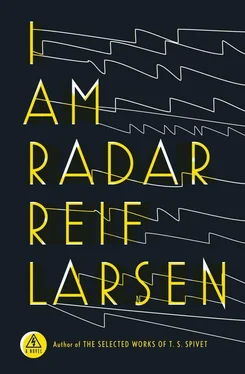“He says he is grateful for this gift we have given his people,” said Horeb. “They will never forget it. They want to give us a goat as a sign of their appreciation.”
“Tell them we don’t want any goat,” said Otik. “Tell them we want to buy that radio. We need radios.”
Horeb spoke with the chief.
“He says he’s sorry, but he cannot give you his radio, because it is important for the protection of his people. He listens to a radio station called La Voix de la Rivière, and this is where he gets the news for his village. This is how they find out if the rebels are coming back.”
“The rebels?” said Lars. “What rebels?”
“He cannot give you the radio, but he offers you a goat.”
“We don’t want any goat,” said Otik.
“I am telling you. . it’s very rude to refuse a goat,” said Horeb. “Usually, a goat is only given as a wedding gift. So you see, it would be unwise to not take the goat.”
They took the goat, though the goat was not pleased to be taken. He bleated and wailed.
On their way back to the barge, Radar noticed several of the children who had danced to his radio, standing and staring at him, hands on their heads.
“Bonjour,” he said. “You are good dancers.”
They giggled and hid their faces. One boy jumped out again and began to gyrate, to the great amusement of all. He was wearing a dirty grey sweatshirt that read NY GIANTS SUPER BOWL XXXV CHAMPIONS, 2001. Though it must be said that Radar did not know much about sports, he was fairly sure the Giants had not, in fact, won that year. He remembered this because he had eaten too much guacamole at a Rutgers alumni Super Bowl viewing party, and his sense of loneliness after the game was matched only by the curious postmortem displays of despair by Giants fans, who looked and acted as if a loved one had just died a horrible death.
“His shirt is wrong,” he whispered to Horeb. “The Giants lost the Super Bowl in 2001.”
“This happens,” said Horeb. “Someone once said Africa exists in a parallel world. When they have a big game like this in America, they make winning T-shirts for both teams. It is America, you see — they must plan for all possibilities. The television cannot wait for the people to go back to the factory and say, ‘Oh, so-and-so has won, please print this shirt.’ And everyone waits patiently on the field. No. . this would not happen in America. So they print both shirts, but only one team can win, and so afterwards they send the shirts of the losing team here. They donate them to the starving Africans and they feel very good about themselves. So you see, there are many little boys and girls running around with a different history on their chests.”
“Should I tell him?”
“I think he already knows,” said Horeb. “He knows which world he lives in.”
• • •
AND SO IT WENT. Up the great river they chugged, past a forest without end, spending long days in the sun, broken only by brief and torrential rainstorms that forced them to head for shore, the rain lashing at the theater wagon and the two containers. They would throw tarps over the equipment and run for cover.
During these storms, Radar would curl up in his cot and listen to the rain pound against the metal roof of the container. He could feel the doubt creeping in then, the little parakeets of discontent imploring him to say what precisely he was doing here. The sky poured buckets, and he was left to wonder if it had all been a mistake.
201-998-2666:Dear Ana Cristina, I miss you. I have come to see life as a collection of diminishing failures. I know this sounds depressing, but I don’t mean it like that — to fail less badly is something to aspire to. Also, I have begun to write. R
He waited in the doorway of the container, watching the rain fall and waiting for the message to not send. But instead of dying in his phone, the icon changed to a checkmark. The text had gone through! Tiny miracle of miracles! Maybe it was the rain. Maybe the ladders of water were conducting his messages into the heavens. Suddenly he felt guilty. He considered texting Ana Cristina and telling her everything that had gone on in Matadi. But some messages, he realized, could not be sent.
201-998-2666:Mom! I’m here! I’m okay. Everything is fine. Have you found Tata? I hope you get this. Love, love, love, RADAR.
This, too, was released. He waited, but no answer came back.
• • •
THEY STOPPED BRIEFLY in Mbandaka, a forgotten river city, both bigger and smaller than it ought to be. They purchased supplies and diesel for the pousser’ s engines and for their own generators, which they were now running day and night, since it was the current from these generators that kept the birds alive and on which their entire show depended. While in Mbandaka, they heard about the unrest upriver. A rebel group had come down from Ituri to take control of a new diamond mine near Basoko. There were stories of mass rape. Whole villages disappearing.
“We cannot be sure what is true,” said Horeb. “That region has been stable since 2002. I’m not saying it is impossible that this is true, but in general, you must say the rebels are interested in the two heads of the serpent and not the body. The war has changed recently. It is less political, more like an exercise in capitalism. Capitalism without regulation. These rebel groups, they are like start-up companies in your America. They want to make money. So if they are killing people, it is for an end.”
“That doesn’t sound like a start-up company,” said Radar.
“I cannot guarantee your safety, but I would not worry. It is your choice.”
Radar worried. Professor Funes emerged briefly to collect his books and then disappeared back into his cabin before they could ask him about the rebel situation. It had been like this ever since they had left. Not once had their host come out to watch their rehearsals or shows, to investigate the action occurring on the deck of his barge. At first this behavior had struck Radar as most unusual, but soon his absence blended with everything else that was strange on the river. It simply became a part of the reality.
And so, as the sun rose in the sky, they pulled out of Mbandaka as if nothing had changed, as if that which had been said could not be known and so had not been said.
For such a grand river, the Congo had surprisingly few boats navigating its waters, bar an occasional fisherman’s pirogue. On the third day, they passed a barge full of perhaps three hundred people and animals that had gotten stuck on a sandbank, but the pousser did not stop, and they chugged on past.
The sounder, always, swinging his pole: “Ah yeah! Mayee! Ah yeah mayee!”
Once, they passed a hand-painted sign sticking out of the water: LE SANDWICH, it read, in careful sans serif. An arrow pointed upward.
“It is unlikely,” said Horeb.
Radar tried to monitor his radios for news of the rebels, though he could not understand the language. Nor was he ever able to locate La Voix de la Rivière.
Yet even if he could not understand what exactly the radios were saying, he made several breakthroughs with their transmission. On the third evening, he figured out how to wire the radios to himself. Using very sensitive electrical nodes adapted from a heart rate monitor he had found in a forgotten drawer inside Moby-Dikt, he connected the radios to several contact points on his temples, wrist, and chest. It took him a while to adjust the sensitivity of the connection and to figure out exactly how he could control the dials without touching them, but once he had determined the correct voltage and resistance, the rest came fairly easily. It was as if the radios had become a natural extension of him. All he had to do was simply envision the radio switching channels and it would change, just like that. When he came upon something in the spectrum that felt right, the radio would hold, as if it too knew what was needed for the performance. This freed up Radar’s hands to flutter across the Morse key and the mixing board.
Читать дальше












